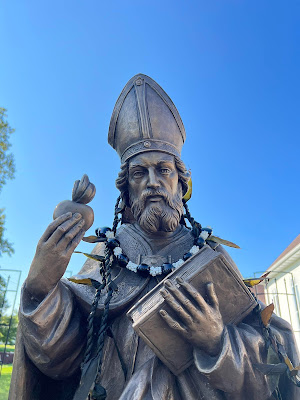Dear brothers and sisters,
It is indeed right and just that tonight we have gathered to rejoice in the gift of so great a patron as Saint Augustine of Hippo. It is fitting that we have gathered at the altar to render thanks to God for so great an intercessor as Saint Augustine of Hippo. But what does it mean to have a patron and intercessor in heaven, especially one like the Doctor of Grace?
 |
| A statue of St. Augustine with a kukui nut and maile lei, Hawaiian signs of affection. |
Much of our society is so dominated by a materialistic mindset to the extent that when we think of patronage, we probably only think of patronizing a business. While it may not be common now, it was once common for shopkeepers to thank customers for their patronage. This understanding of patron began shortly before the nineteenth century, but would have been quite unknown for most of the last two and half millennia or more.
Our English word patron comes from the Latin patronus, meaning defender or protector, which comes from pater, meaning father. Historically, a patron was one who defended and protected someone as a father would defend and protect his child. It is in this sense that the Church adopted the word in reference to the saints of God and their relationship with the Church on earth.
Consequently, it became customary to choose a heavenly patron based on a shared aspect of life. Such patronage is founded in Christian love. As Saint John reminds us, “Beloved let us love one another, because love is of God” (I John 4:7). Loving one another requires that we look after one another’s good and strive to bring about what is good for each other. This mission of love does not end with physical death, but becomes even more important for the Saints who look upon the Face of God; they love those whom God loves.
Saint Augustine became the patron of brewers because he enjoyed partying as a young man; he became the patron of printers and theologians because of his voluminous spiritual and theological writings as an older man. His patronage, however, does not stop there; he is also the patron of several cities, either because of the presence of his relics or because they bear his name. What is more, he is our patron, as well.
After the Emperor Constantine made Christianity legal throughout the Roman Empire in a.d. 313, churches were built over the tombs of the martyrs and therefore received the names of those whose tombs they marked. This practice spread beyond the tombs of the martyrs to the tombs of other early Christians who had a reputation of holiness. As the number of Christians increased and more churches were needed, these, too, were named after the saints, even if they were not built over their tombs.
In 1875, our parish and church were dedicated first of all to God, but also to Saint Augustine of Hippo, who lived a most remarkable life of sin, but also an extraordinarily holy life after his heartfelt conversion. Because of his association with our church and parish, Saint Augustine has a particular fatherly care for us as our heavenly defender and protector. His patronage over us is something we too often overlook and under appreciate.
While we may not be brewers, printers, or theologians, we can nevertheless relate to Saint Augustine because he is not that different from us. He fell into a life of sin and resisted the call to repentance because he enjoyed his sinful way of life. More importantly, though, he knew the joy that comes from repentance and being raised up again by the Lord Jesus. Like us, Saint Augustine searched for truth and found it in Christ. He felt overwhelmed by his many duties. And he knew the beauty of a life lived for others and for God. In all of this, he is a man like us who knows well what our lives are like. He is a perfect patron for us precisely because he is very much like us. We do well, then, to call upon his intercession in every aspect of our daily lives.
Saint Augustine himself frequently called upon the intercession of the saints, especially the martyrs, and asked them to pray for him to God. Among his many writings, we find these words: “At the Lord’s table we do not commemorate martyrs in the same way that we do others who rest in peace so as to pray for them, but rather that they may pray for us that we may follow in their footsteps.”[1] As a loving father desires to look after the needs his children, so does Saint Augustine desire to look after us with a love that imitates the goodness of God (cf. I John 4:11).
I urge you, then, dear brothers and sisters, to turn to Saint Augustine in all of your daily needs. Ask his prayers in the midst of your troubles. When you are in doubt, ask him to help you see the truth. When you are sorrowing, ask him to comfort you and assure you of the goodness of God. Ask him to share with you his love of the Scriptures. Above all, ask him to help you meditate on the mysteries of God and teach you the wisdom of what he has learned (cf. Sirach 39:7-8). If you do, Saint Augustine will teach you how to live in love and will lead you to look upon the Face of God, who is love itself (cf. I John 4:8, 12). Amen.




